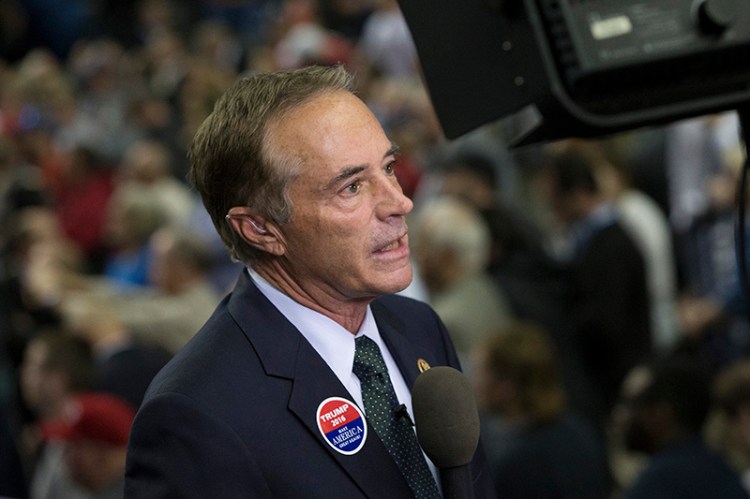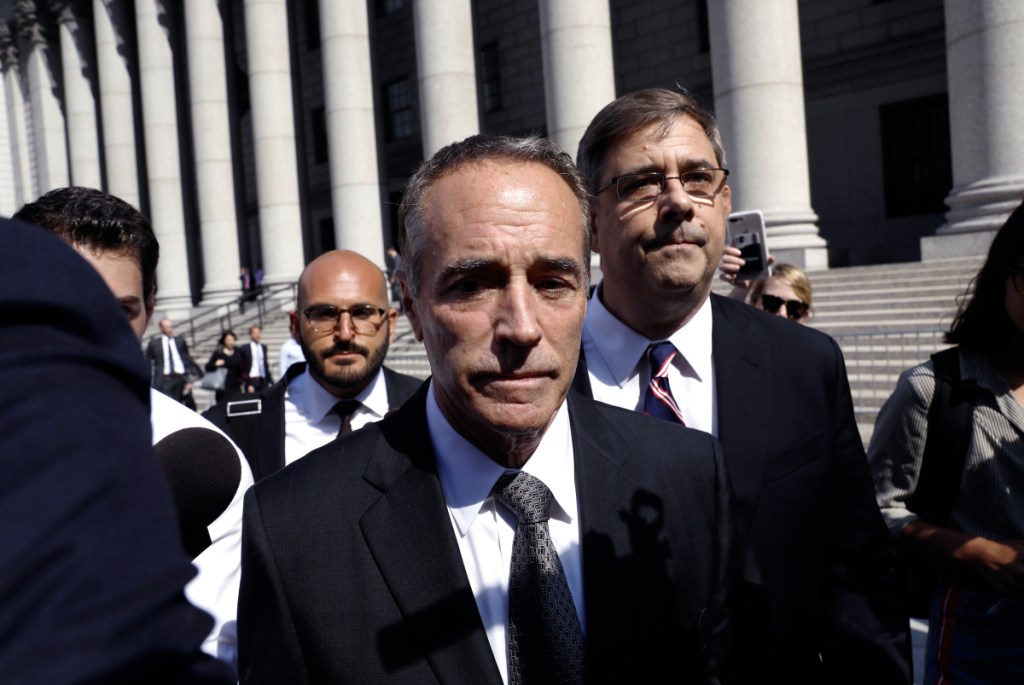Indicted Rep. Chris Collins, R-N.Y., announced Saturday that he would not run for re-election this fall as he battles federal charges for insider trading.
“After extensive discussions with my family and my friends over the last few days, I have decided that it is in the best interest of the constituents of NY-27, the Republican Party and President Trump’s agenda for me to suspend my campaign,” he wrote in a statement posted on his official Twitter account.
Federal prosecutors on Wednesday charged Collins with providing his son, Cameron, nonpublic information about drug trial results for a biotechnology company, Innate Immunotherapeutics, where the congressman sat on the board of directors. Cameron Collins and several others allegedly used the information to avoid more than $768,000 in losses to their own stock holdings.
Collins, the first member of Congress to endorse President Trump’s 2016 campaign, has pleaded not guilty and initially pledged to fight the charges while continuing to campaign in one of the most Republican-leaning districts in New York, which includes the outskirts of Rochester, Niagara Falls and Buffalo along Lake Ontario.
Democrats, who have long seen the district as a long shot, pounced on the allegations by arguing that they highlighted corruption in the Republican Party, which is emerging as a major campaign theme. The Democratic candidate in the race, Nate McMurray, the town supervisor of Grand Island, had struggled to raise funds before the charges were announced.
Hours after Collins’s announcement, House Minority Leader Nancy Pelosi, D-Calif., said Speaker Paul Ryan, R-Wis., should call for the New York congressman’s immediate resignation.
“No person is above the law, not the president or his first supporter in Congress,” Pelosi said in a statement. “This insufficient and overdue announcement does little to drain the toxic cesspool of self-enrichment, special interest deals and corruption that has proliferated in Washington under GOP control.”
Democrats need to pick up 23 seats in the House to gain control of the chamber next year, though the party is likely to focus its energy on dozens of other seats that are more competitive, even after the news of the indictments. In the 2016 election, Trump beat Democratic candidate Hillary Clinton in the district by nearly 25 percentage points.
Under New York State law, candidates who have been nominated by a party are bound to appear on the ballot with a few specific exceptions, like when the candidate moves outside the district or gets nominated for another position in the same election.
“What officials are likely to do is nominate him for a town clerkship, which will allow him to vacate the ballot legally,” said a Republican consultant involved in the race Saturday, who spoke anonymously to discuss internal party deliberations. It was not clear if Collins would actually serve as a town clerk if he is elected to that office.
Local party officials believe there is still time for them to choose a new candidate to get that person’s name onto the ballot for the Nov. 6 election, the consultant said.
Collins says he still plans to serve out the remainder of his current term, though he will do so in a diminished capacity. He has already been stripped of his position on the House Energy and Commerce Committee by Ryan.
Cameron Collins and Stephen Zarsky, the father of his fiancee, were also charged as part of the scheme and have pleaded not guilty. In addition to the securities allegations, the three men face counts for lying to federal agents during the investigation and a lawsuit from the Securities and Exchange Commission. In addition to fines, they could each face at least five years in prison if convicted, according to legal observers.
Collins had previously been under investigation by the Office of Congressional Ethics, which found last year that there was “substantial reason to believe” that Collins violated the law by meeting with government regulators in his official capacity in a way that could benefit the Australian drug company.
Prosecutors say that Collins received an email in 2017 from an executive at Innate Immunotherapeutics alerting the company’s board that a recent drug trial had been a failure. The information was not public at the time, but Collins allegedly called his son to tell him, setting off a chain of stock sales that allowed the congressman’s family and their friends to avoid losses on their shares.
In his statement Saturday, the congressman said that he would continue to fight the charges. “I look forward to having my good name cleared of any wrongdoing,” he wrote.
Send questions/comments to the editors.




Comments are no longer available on this story